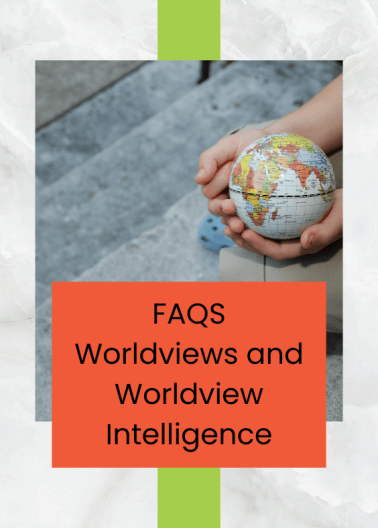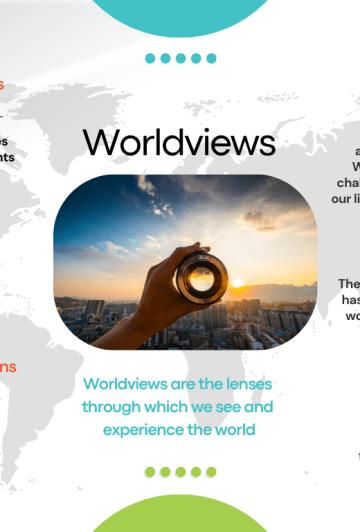Worldviews and Worldview Intelligence
These are the Frequently Asked Questions we receive about worldviews and Worldview Intelligence. Let us know if you have additional questions.

1. What is a worldview?
Worldviews are the lenses through which we interpret and make meaning of the world around us. It includes our beliefs, values, experiences, culture, and assumptions. Everyone has a worldview, usually unconsciously shaped by upbringing, education, religion, culture, and life experiences.

2. Why do worldviews matter in the workplace or organizational settings?
Worldviews influence how we make decisions, communicate, solve problems, build relationships, and lead. Misunderstandings and conflict often arise not from intent, but from differences in worldviews that go unrecognized or unacknowledged.
3. What is Worldview Intelligence?
Worldview Intelligence is the ability to skillfully give voice and visibility to multiple worldviews in order to open explorations, make connections and bridge differences while maintaining compassion and humility. It fosters deeper communication, collaboration, and trust including in complex or polarized environments.
4. What is the Worldview Intelligence Six Dimensions Framework?
The Worldview Intelligence Six Dimensions Framework offers a simple, elegant structure to invite and engage individuals, teams, and organizations in reflecting on and understanding their own worldview, recognize others’, and build the capacity to bridge worldview differences. The Six Dimensions are: Reality, History, Future, Values, Practices and Knowledge.
5. Is this the same as cultural intelligence or emotional intelligence?
Not exactly. While there’s overlap, Worldview Intelligence focuses on the deeper structure behind how people make meaning – beyond emotions or cultural norms alone. It complements emotional intelligence and cultural competency by giving people tools to engage across different belief systems and mental models.
6. What are the benefits of applying Worldview Intelligence in organizations?
• Greater trust and psychological safety.
• Reduced conflict and misunderstanding.
• More inclusive, effective and transparent communication.
• Stronger alignment and engagement.
• Enhanced capacity to lead through complexity and change.
7. How is Worldview Intelligence different than traditional diversity, equity and inclusion (DEI) approaches?
Worldview Intelligence doesn't necessarily replace DEI work – it provides a different orientation to psychological safety and belonging. It goes beyond visible identity categories and explores the underlying perspectives and assumptions that shape behavior. It offers a language and process for navigating sensitive or polarized topics without shutting people down and acts as an invitation into exploration.
8. Can Worldview Intelligence help in polarized environments or during conflict?
Yes. In fact, it’s one of the most powerful applications of Worldview Intelligence. The Six Dimensions Framework is designed to hold multiple perspectives without requiring agreement. It helps people move from entrenchment to curiosity, from reaction to reflection, and from opposition to dialogue.
9. What does a Worldview Intelligence program or workshop typically involve?
Sessions are interactive and experiential, blending theory with practical tools. Topics include:
• What worldviews are and how they are formed.
• The Six Dimensions of worldviews.
• How to surface, name, and explore worldviews.
• An understanding of neuroscience and behavioral science as it relates to how worldviews are reinforced or challenged as well as typical human behaviors.
• Strategies for engaging across differences.
• Applications in leadership, collaboration, and change initiatives.
Ask us for specifics to your issue or opportunity.
10. Who is Worldview Intelligence for?
• Leaders and managers navigating change or team dynamics.
• Facilitators and consultants supporting dialogue or transformation.
• Educators and community leaders fostering inclusion, belonging and understanding.
• Organizations seeking healthier team and workplace cultures, innovation, or conflict resolution.
And it is an exceptional personal and professional development program for anyone.
How do I know if our team or organization needs this?
If you’re experiencing:
• Miscommunication or misunderstandings.
• Low engagement or trust.
• Difficulty moving through change or conflict.
• A need to better understand diverse employee or stakeholder perspectives.
• Want to increase psychological safety and belonging.
• Or want to grow team cohesion and performance…
…then Worldview Intelligence could offer a fresh, effective approach.
